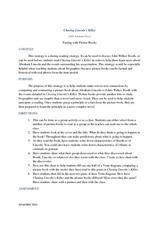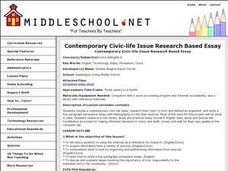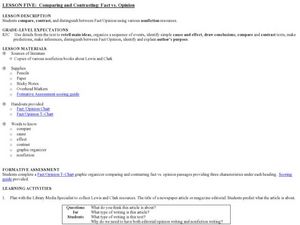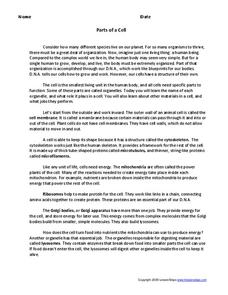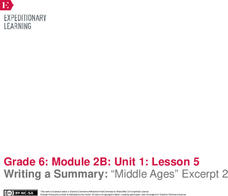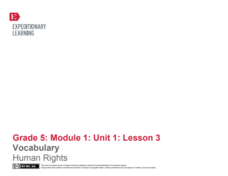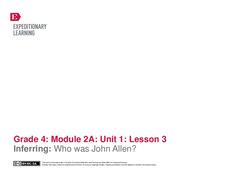Curated OER
The Civil War Through a Child's Eyes
Middle schoolers focus upon the Civil War era using research methods of drawing information from primary sources. Literature and photographic images reflect, communicate, and influence human perspectives of historical events. The lesson...
Curated OER
Let's Look at Legends: Oregon quarter reverse
Analyzing historical legends is a fun way to develop critical-thinking skills. Pupils will use a graphic organizer to compare and contrast two historical legends relating to volcanoes. While this lesson focuses on the image of Crater...
Curated OER
Pairing with Picture Books: Chasing Lincoln's Killer
Readers of Chasing Lincoln’s Killer, James L Swanson’s young adult novel, use a Venn diagram to compare information about Abraham Lincoln and the events surrounding his assassination, with the images and information presented in picture...
Curated OER
Contemporary Civic-life Issue Research Based Essay
Seventh graders write a five paragraph persuasive essay on a contemporary civic-life issue.
Curated OER
Perceptions of German Unification Over Time
Through a series of readings and handouts, learners will study the shifts in perception that followed the fall of the Berlin Wall. The history lesson focuses on periods of change in post WWII German history that led to a changed...
Curated OER
Comparing and Contrasting: Fact vs. Opinion
Elementary schoolers investigate nonfiction stories by analyzing facts and opinions. They read nonfiction stories about the Lewis and Clark expedition. Pupils utilize a T-chart to list the facts and opinions on opposite sides, and then...
Curated OER
African Americans in the Civil War
Eleventh graders examine the role of African-Americans in the Civil War. After reading a poem, they analyze and identify the difficulties faced by African Americans. In pairs, they complete a worksheet based on the poem and information.
Curated OER
The Gettysburg Address
In this social studies worksheet, students learn about Lincoln's delivery of the Gettysburg Address by first reading an information paragraph about the history of the speech. Students then read the complete text of the speech. There are...
Curated OER
Parts of a Cell
Simplify the parts of a cell with this handout and brief activity. Learners read a two-page explanation of the parts of a cell that includes bolded vocabulary words. Using what they have just read, class members answer 19...
Curated OER
People are People
Explore human diversity in this human rights instructional activity. Middle schoolers compare novels, speeches, videos, and short stories that promote diversity and basic human rights. They complete daily coursework as they read the...
Curated OER
President Bush Balances Power
High schoolers review the results of the November 2006 mid-term election. Using their text, they read the history of the balance of power and examine recent news articles. They present their findings to the class and may even hold a debate.
Curated OER
Learning from the Past: A New Approach
Young scholars research nonprofit organizations. As they research, they learn how those living in the colonial period formed community organizations to provide for the common good of their society. Each pupil chooses one organization to...
Curated OER
Identify Intended Media Messages
How does media convey different messages? Use this lesson to explore media by identifying and analyzing selected images. Middle schoolers analyze a poster and discuss the intended meaning of the imagery and how it makes them feel. They...
Curated OER
The History of Paper Money
Pupils research the history of paper money using the Internet in order to answer questions and create their own bills.
EngageNY
Writing a Summary: “Middle Ages” Excerpt 1
What's this all about? Scholars learn the importance of summarizing skills using a summary writing graphic organizer. They work with an elbow partner to discuss summaries and complete the organizer using Middle Ages Excerpt 1. Learners...
EngageNY
Writing a Summary: “Middle Ages” Excerpt 2
What is the big idea? Scholars use Middle Ages Excerpt 2 to complete a summary graphic organizer. They then use the information from the organizer to write a summary of the text on lined paper. Learners share summaries with the class.
EngageNY
Final Performance Task: Presenting Graphic Novelettes
Let's get graphic. Serving as the final performance task of the unit, scholars complete their graphic novelettes and design covers based on their sketches. Finally, they present their hard work to classmates.
EngageNY
Close Reading: The Introduction to the Universal Declaration of Human Rights
As part of a group of lessons, your class will return to the primary text for this unit, the Universal Declaration of Human Rights. Key vocabulary as well as close reading strategies continue to be the focus skills; however, this lesson...
EngageNY
Vocabulary: Human Rights
Your class continues to explore the history of the Universal Declaration of Human Rights. In addition to learning about the background of this text, learners work on the skill of identifying and understanding key academic vocabulary....
Louisiana Department of Education
Out of the Dust
The Grapes of Wrath may be the most famous novel set during the Dust Bowl, but what other stories cover the same time? The unit focuses on the Karen Hesse novel Out of the Dust. Learners keep a timeline of the Dust Bowl, maintain a...
EngageNY
Close Reading: Unpacking Specific Articles of the UDHR
Lesson 6 of this extensive unit finally has your class begin to work their way through specific articles from the text of the Universal Declaration of Human Rights (UDHR). Before examining the rights actually detailed in the document,...
EngageNY
Inferring: Who was John Allen?
Help your learners work with difficult or archaic words. A continuation of lesson two of this module, the plan here focuses on deciphering the Inventory of John Allen, in particular the unfamiliar words that make up much of the list. Add...
Curated OER
The Grimm Truth—Comparing & Contrasting Children’s Stories and Fairy Tales in Cross-Cultural Texts at Different Points in Time
High schoolers explore world literature through completing several varied exercises. In this compare and contrast lesson plan students compare and contrast stories and how time and culture impacts the stories.
EngageNY
Building Background Knowledge: Why Do Workers Strike? (Chapter 11: "Los Aguacates/Avocados")
Make connections between Esperanza Rising and human rights with the activities outlined here. The instructional activity starts out with a brief quiz and review of the novel. After that, pupils circulate and share quote strips that you...




